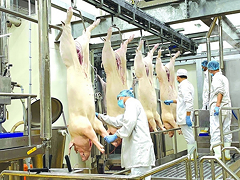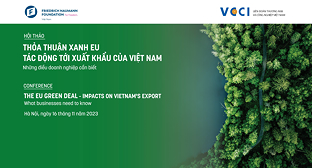Discharging technical barriers to limit the import of livestock products
03/04/2024 07:06

According to statistics, in 2023, Vietnam will import over USD 3.5 billion of livestock products, nearly 7 times more than exports (more than USD 0.5 billion). According to assessments of associations in the livestock industry, compared to countries with developed livestock industries, our country's regulations on importing livestock products are not strict and have many loopholes. Meanwhile, to export poultry meat and eggs, businesses have to endure many strict technical barriers in importing countries, making our livestock products vulnerable and disadvantaged in the domestic market.
The risk of becoming a super-importing country
Regarding strict control of import issues, units including: Vietnam Livestock Association, Vietnam Animal Feed Association, Vietnam Large Cattle Breeding Association, Vietnam Poultry Breeding Association said that compared to countries with developed livestock industries, our country's regulations on importing livestock products are not strict and have many loopholes. Meanwhile, to export meat and poultry eggs, Vietnam's livestock industry must endure many strict technical barriers in importing countries.
Talking more insight into this situation, Mr. Nguyen Thanh Son, Chairman of the Vietnam Poultry Association, said that the trade deficit of livestock products is on the rise, of which the amount of imported pork in 2023 has increased by 85% compared to the same period in 2022, buffalo and beef meat has also increased by 56%, and the amount of poultry meat still imported is over 200,000 tons (equivalent to 2022).
This makes livestock products weak and disadvantaged right in the domestic market, causing unfair competitive pressure on domestic livestock products. Because livestock products currently officially imported are mostly secondary products that are rarely used as food in other countries, such as heads, wings, hearts, kidneys, gizzards, laying hens and waste dairy cows. Not to mention that these are foods that have almost expired, so they are very cheap; only half of the domestic price of the same type when imported. In addition, the massive import of livestock products also reduces investment opportunities and motivation for domestic businesses and livestock farmers, and in the long run national food will be directly affected. With the current import rate, it is predicted that in the next 3-5 years, when tariff lines on imported livestock products reach 0%, Vietnam will become a super importer of livestock products.
“This may be an exception that happens too quickly compared to many countries in the process of industrialization and modernization, so the state needs to have policies and time so that domestic livestock farmers and businesses can adapt.", the above associations emphasized.
Measures are needed to increase competitiveness
Besides the difficulties of competitive pressure when massively importing livestock products, livestock associations also stated an additional difficulty for consuming domestically produced livestock products.
Specifically, according to the provisions of Clause 1, Article 1 of the VAT Law amended in 2016, livestock products such as poultry eggs are cleaned and packaged; Cattle and poultry meat after slaughter, cooling, freezing... if purchased, sold or exchanged by businesses and cooperatives, is exempt from 5% VAT, but if businesses and cooperatives produce and trade Businesses that sell this item to people and individual business households are subject to a 5% tax. This regulation is causing many difficulties for the consumption of domestically produced livestock products. The reason is that in Vietnam, the majority of unprocessed livestock products are consumed at individual business households and in traditional markets. Livestock products that go through preliminary processing and industrial slaughter incur more costs than manual slaughter (a problem that is causing too many risks in terms of disease, food safety and the environment) but must add 5% VAT, they will not be able to compete with floating livestock products that are not controlled in quality, safety, tax and with imported livestock products of the same type, such as frozen meat and whole chickens. These products are not subject to VAT at the import stage.
Meanwhile, currently in our country's livestock production chain, the weakest stage is slaughtering and processing. In this regard, the government has many guidelines and policies to encourage centralized and industrial development, but so far it has not been successful. Many businesses invest in modern, expensive factories and equipment lines, such as: DABACO, Masan, Visan, C.P... but the products produced cannot be sold, the actual production output only accounts for around 30 % of design capacity. The main cause of these problems is that we have not been able to control manual slaughter activities in terms of production and business conditions, which is an obstacle to this activity of businesses and cooperatives.
Therefore, to increase the competitiveness of Vietnamese livestock enterprises, livestock associations propose that the Government and National Assembly amend this content in the VAT Law. While waiting for the Law to be amended, it is proposed to temporarily suspend the implementation of this regulation for livestock products.
Recommendations on policies for official imports, Mr. Nguyen Xuan Duong, Chairman of the Vietnam Livestock Association, said that it is necessary to urgently build technical barriers and trade policies to minimize official import of livestock products. Including the issue of strengthening quarantine measures, quality inspection and minimizing the number of border gates allowed to import live livestock into Vietnam, as typically experienced by countries around the world such as: America, China, Thailand, Japan, Korea... are doing it very effectively. For example, they make requirements for cold heat treatment with complex technology and high costs, or each country on average only allows 3-5 border gates by land, sea, and air to be imported live animals only. Meanwhile, Vietnam has over 30 border gates of all kinds that are allowed to import live livestock into the country.
Regarding informal imports, all forms of import and use of livestock and livestock products imported in this form are prohibited, because our domestic livestock products have met the needs of domestic livestock and livestock products, in addition, Vietnam has a long border, the surrounding countries are not countries with good veterinary work and disease control.
Source:Custom News
Các tin khác
- Exports face challenges despite enjoying robust growth (26/04/2024)
- Vietnam ranks fifth among aquatic product suppliers for Singapore (26/04/2024)
- Some firms likely to close due to higher anti-dumping tariff on plywood products in S Korea (26/04/2024)
- Foreign businesses increasingly seek export sources in Vietnam (26/04/2024)
- Japan's investigation into China's graphite electrodes to 'affect regional cooperation' (26/04/2024)
 Home
Home
 About Us
About Us




















